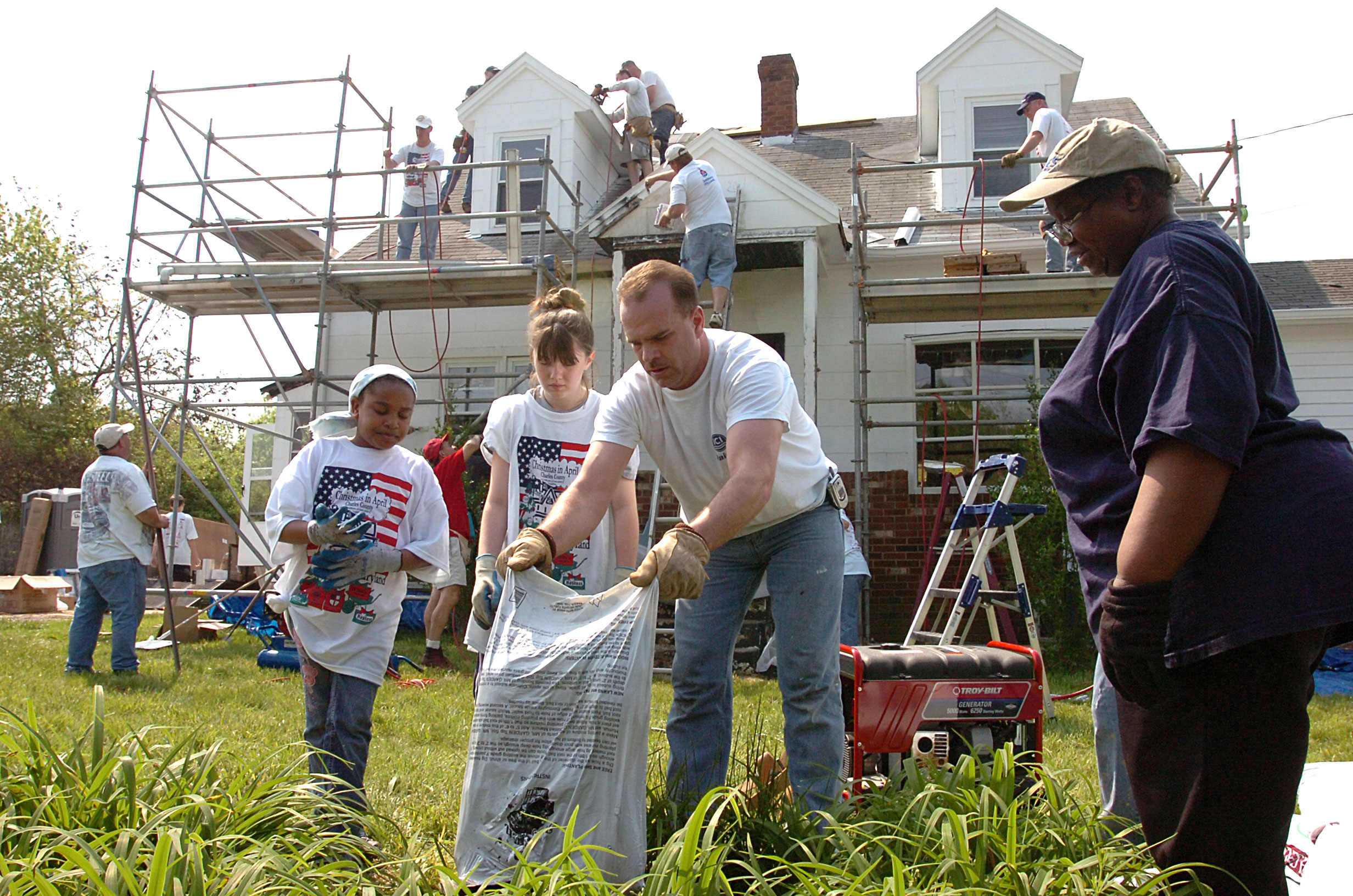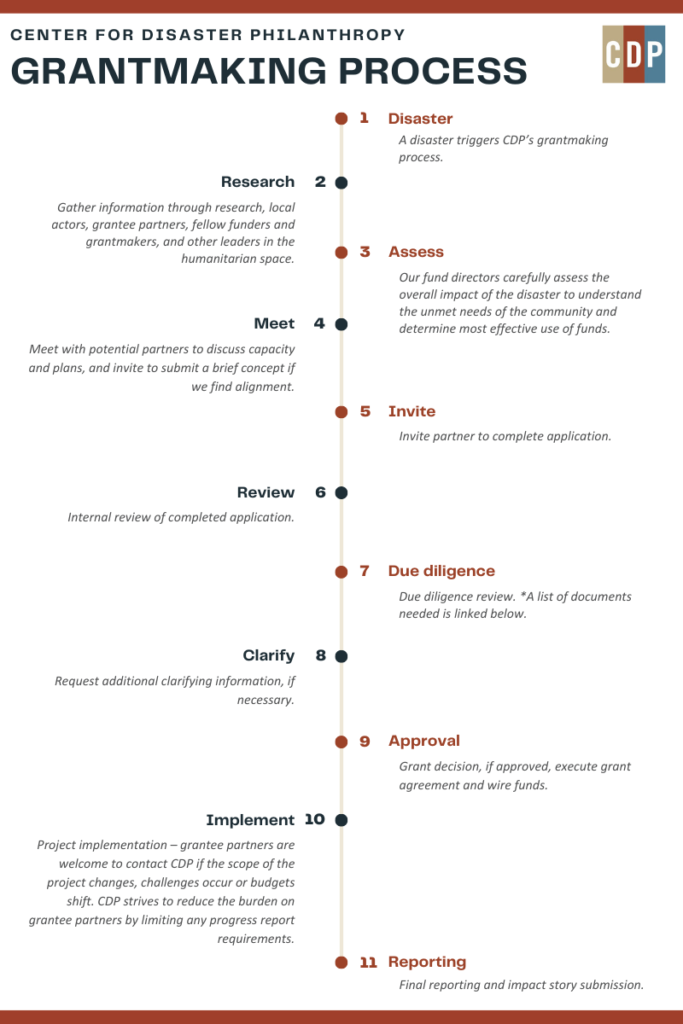Our grantmaking process
Our grantmaking is community-driven, equity-focused and holistic

At the Center for Disaster Philanthropy, our grants support medium- and long-term recovery and resilience efforts in communities affected by natural and human-made hazards, including conflicts and humanitarian crises.
With a focus on historically marginalized and at-risk populations, CDP prioritizes investments in local organizations to support a range of programs critical for individuals’ and communities’ recovery.
CDP’s funding does not support the following:
- Any grants unrelated to a disaster or crisis.
- Annual campaigns.
Click here for the list of our active funds.
What organizations we fund
CDP funds U.S.-based nonprofits, including fiscal sponsors and fiscal agents on behalf of non-501(c)(3) organizations, and non-U.S. based nongovernmental organizations with registered nonprofit status in the country in which they are legally formed. All grantee partners must successfully complete our due diligence process.
CDP considers supporting organizations that have all or some of the following characteristics:
- Have a localized and community-led approach deeply rooted in affected communities.
- Are led by and/or are serving historically or currently marginalized and at-risk populations.
- Have the capacity to successfully implement disaster recovery and resilience programs in the specified timeline.
- Integrate capacity building and systems strengthening in their programs.
At this time, CDP does not grant to for-profit organizations and individuals, including scholarships, travel assistance or conference fees.
How we fund
Our grantmaking is guided by the following principles, based on CDP’s values of integrity, boldness and innovation, humility, and empathy:
- Community-led and driven – We connect with and listen to disaster-affected communities. We prioritize partnerships and programs built on connections with community members and locally-led organizations, including funders.
- Localization – We strive to grant to locally-led entities as much as possible. For domestic U.S. programs, this forms the majority of our grantmaking. For international grantmaking, we seek to ensure that at least 25% of our grants go directly to local and national stakeholders in the countries in which the projects are being implemented. When granting to our trusted international partners with deep roots in those countries, more consideration is given to those that empower local and national stakeholders.
- Equity – We aim to grant funds with an equity lens, focusing on the needs of historically or currently marginalized and at-risk populations and addressing systemic inequities, especially in geographic regions prone to significant impact from disasters.
- Capacity strengthening – We are committed to increasing the capacity of local organizations to assist communities when disasters strike. This could mean funding equipment, office space or software, but we also often fund staff positions such as disaster case managers and recovery coordinators.
- Flexibility and transparency – While CDP has limited unrestricted funding opportunities, we aim to be as flexible and transparent as possible with grantee partners in both discussions and funding. We seek to reduce the administrative burden on grantee partners by implementing a streamlined and efficient grantmaking approach.
- Partnership – We aim to work alongside our grantee partners to support long-term recovery initiatives with relevant and sustainable impact. We strive to cultivate partnerships built on mutual trust, respect and transparency.
- Equitable sustainability – Within its grantmaking, CDP strives to create constructive, honest and equitable partnerships built on mutual respect, trust and a shared understanding of organizational needs. CDP believes that funding indirect costs for grantee partners supports their sustainability, their fiscal health and the effectiveness of their programming. We are committed to ensuring as much funding as possible is used for program implementation while also ensuring the implementing organization has sufficient overheads to run their organization. Consequently, we have adopted a tiered approach to indirect cost recovery (ICR) for intermediary organizations. We permit and encourage local implementing partners to take up to the maximum allowable rate for their ICR. Read our Indirect Cost Recovery guidelines to learn more.
Grantmaking process

Due diligence documentation
To meet United States compliance requirements, the laws of international countries and international philanthropic guidelines, we complete due diligence on potential grantee partners assisting in disaster response or recovery.
Our process includes reviewing each organization’s mission, programs, governance structure and financial stability.
Below are the documents needed from our U.S.-based grantee partners:
- W-9.
- Wire transfer form.
- IRS Determination Letter of non-profit status.
- Current independent audit or review.
- If there is no current audit, please provide current financials from your accounting system (including a balance sheet as of the current date and a profit & loss statement for the prior fiscal year and YTD for the current fiscal year) in lieu of an audit.
- Most recent available Form 990.
- Memorandum of Understanding (if fiscally sponsored).
- List of board members and senior staff.
Below are the documents needed from our non-U.S.-based grantee partners:
- Wire transfer form.
- Documentation reflecting the non-U.S. nongovernmental organization (NGO), nonprofit status in the country where your organization is legally formed.
- Documentation reflecting the registration of the non-U.S. NGO as a charitable organization in the country in which the project will be implemented.
- Current independent audit or review of NGO’s financial statements.
- If no current audit, please provide current financials from your accounting system (including a balance sheet as of the current date and a profit & loss statement for the prior fiscal year and YTD for the current fiscal year) in lieu of an audit.
- Latest tax form completed annually or periodically by NGO, if applicable.
- List of board members and senior staff.
CDP does not accept unsolicited proposals. The results of our assessments determine which nonprofit organizations will be invited to apply for funding.
CDP does not solicit fees or any form of payment from grant seekers. Charity Navigator has good tips to help protect yourself and your donation.
Please contact the Domestic or International grantmaking team with any questions about the grantmaking process, such as grant applications or grant awards.
Please view sample copies of our domestic grant application, international (U.S.-based organizations) grant application, international (non-U.S.-based organizations) grant application and budget template: